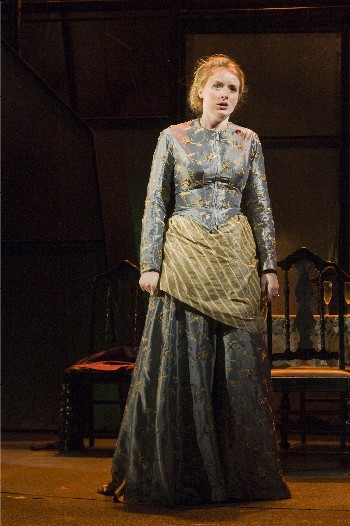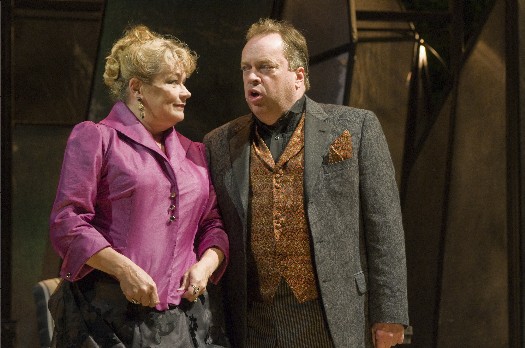Theater Review: All’s Well, I Guess — Girl Gets Boy, Boy Ditches Girl, Girl Gets Boy Back
The likable Commonwealth Shakespeare Company staging leans very heavily on the comedy in ALL’S WELL THAT ENDS WELL, minimizing the Bard’s problematic undertow.
All’s Well That Ends Well by William Shakespeare. Directed by Steven Maler. Staged by the Commonwealth Shakespeare Company at the Boston Common, Boston, MA, through August 14.
By Bill Marx

Kersti Bryan (Helena) wonders where hubby Bertram is in the Commonwealth Shakespeare Company production of ALL'S WELL THAT ENDS WELL. Photo: Andrew Brilliant/ Brilliant Pictures.
New York’s Public Theatre’s outdoor Shakespeare production this summer is also the rarely performed All’s Well That Ends Well, and it is impossible not to wonder why this bitter comedy has come into mini-favor now. It could be because the Bard’s lop-sided romance anticipates the Jed Aplow film formula: the fair and intelligent Helena loves Bertram, a bratty guy who refuses to grow up and marry, preferring to make war, hunt for female conquests, and pal around with boy/men such as Parolles. The woman-as-savior angle also supplies a powerful spin on convention: Girl Gets Boy, Boy Ditches Girl, Girl Gets Boy Back.
Helena goes to ingenious lengths to win what she perceives to be her Superman (All’s Well That Ends Well was one of Bernard Shaw’s favorite Shakespeare plays), part of an ironic vision in which the female characters provide what grace, healing, and strength are to be found in a world where men are generally sick, boastful, deluded, and bullying. In other words, All’s Well is an ambivalent love story/proto-feminist fable tempered, some would argue curdled, by an acidic sense of “beware what you wish for,” which has made it a difficult sell to audiences who expect happily-ever-after in a comedy.
Compounding the challenges is that All’s Well comes from the latter part of Shakespeare’s career, its experimental amalgamation of death, magic, and seeming resurrection at times clumsily trying-out the wizardry of the superior late romances, such as The Winter’s Tale. By this point, the verse has become knotty and contorted. There are some wonderful speeches, such as Parolles’s “Simply the thing I am/ Shall make me live,” but the free-wheeling lyricism found in the earlier comedies is in short supply, throttled by a repression that has seeped into the syntax.
The trick for a production, as least from the few times I have seen the play staged, is to add charm and elegance to the Bard’s experiment in dramatizing the tarnished triumph of “muddied fortune” –- set in the late nineteenth century, the likable Commonwealth Shakespeare Company staging leans very heavily on the comedy, minimizing the Bard’s problematic undertow. Kersti Bryan gives a strong performance as a gracefully determined, non-neurotic Helena, but the pleasant evening comes off as more amusing than provocative, lacking the sardonic pizazz and head-spinning strangeness of the late romances.
After saving the dying King of France with medicines developed by her dead physician father, Helena asks she be rewarded with the hand of the man she loves, Bertram. The King obliges, despite Bertram’s protests. Yes, he is a cad, marrying Helena and then running off to battle in Italy after setting conditions that essentially render the marriage moot. But who can blame him for not wanting to play a passive part in Helena’s fairy tale machinations? The guy’s love is compelled rather then freely given. And what kind of woman wants a husband by fiat?
Maler softens hardhearted Bertram rather than investigates Helena’s obsession, which turns Nick Dillenburg’s Bertram into a bit of a schizo. A prolonged opening mourning sequence, during which the character hugs the coffin of his recently diseased father, suggests that the son is intimidated by having to live up to the example of his legendary dad. There is another wordless tableau at the end of the play in which it is made to look as if Bertram has come to appreciate Helena’s virtues.

Karen MacDonald (Countess of Rossillion) and Larry Coen (Lavatch) exchange views in the CSC's ALL'S WELL THAT ENDS WELL. Photo: Andrew Brilliant/Brillant Pictures
Maler’s most inventive directorial addition is a brief dumb show that, via the kinky use of a blindfold, attempts to make some sense of Helena’s choice of the sense-defying “bed trick” to corral Bertram. The cowardly Parolles is blindfolded by his comrades and made to think he is being interrogated by the enemy –- fearing for his life, he confesses the ugly truth about Bertram and his army buddies. Both men have to be blinded and then humiliated in order to face the truth. Helena, despite the public ignominy of rejection, perseveres to be true to her passion — a very nice touch.
Fred Sullivan, Jr. barks too much as the irritatingly boastful Parolles, and the long sequence in which the character is interrogated isn’t very funny (senses of humor were much more sadistic in those days). The actor does well by the “Simply the thing I am/ Shall make me live” resolution, though it would be more effective if there was less emotional exhaustion and more existential panache in his voice. The other clowns are more skillfully nuanced, especially Larry Coen, who turns Lavatch’s dark skepticism into a self-conscious performance, a nihilistic stand-up act; Remo Airaldi is suitably cantankerous, fussy, and occasionally ferocious as the old lord Lafew.
Karen MacDonald, as Bertram’s sophisticated and humane mother, The Countess of Rossillion, brings her usual comic energy to the role, the actress’s playful interactions with Coen providing some delightful panto highlights. She is less nimble at showing a mother’s dawning horrified realization that her beloved son is an insensitive snob. As the King of France, Will LeBow’s booming voice undercuts his illness in the early scenes, but it serves him well when he is up and about, thundering his displeasure, ready to send those who cross him to prison. As Diana, the object of Bertram’s lustful attentions, McCaela Donovan also slings some feisty salvos at male arrogance and prerogative. If only the lightweight CSC production had not bypassed some of the other acrid explosions in All’s Well.
Bill Marx is the editor-in-chief of The Arts Fuse. For over three decades, he has written about arts and culture for print, broadcast, and online. He has regularly reviewed theater for National Public Radio Station WBUR and The Boston Globe. He created and edited WBUR Online Arts, a cultural webzine that in 2004 won an Online Journalism Award for Specialty Journalism. In 2007 he created The Arts Fuse, an online magazine dedicated to covering arts and culture in Boston and throughout New England.
Tagged: All's Well That Ends Well, Commonwealth-Shakespeare-Company, Steven Maler

